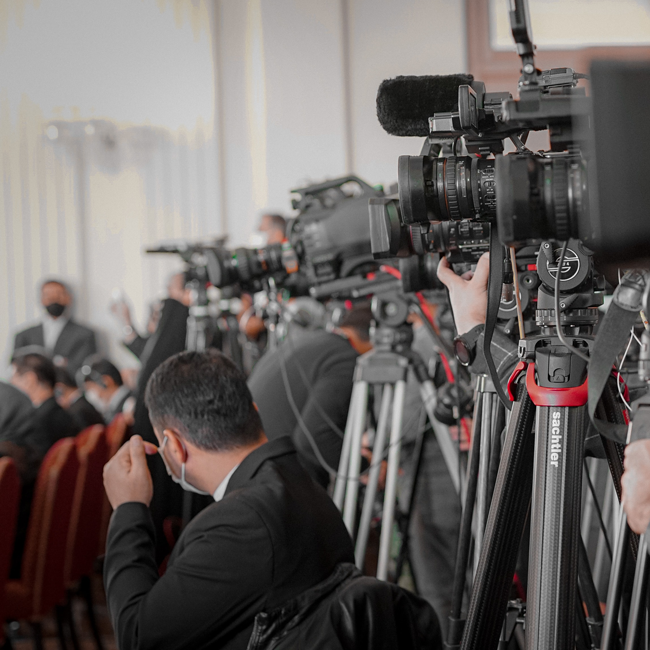One giant leap for man, one step back for everyone else: Why space exploration must be inclusive

One giant leap for man, one step back for everyone else: Why space exploration must be inclusive
Opinion + AnalysisBusiness + LeadershipScience + Technology
BY Dr Elise Stephenson Isabella Vacaflores 14 SEP 2023
Greater representation of women and minoritised groups in the space sector would not only be ethical but could also have great benefits for all of humanity.
The systematic exclusion of women – and other minoritised groups – from all parts of the space sector gravely impacts on our future ability to ‘make good’ our space ambitions and live out the principle of equality. Minoritised groups refer to groups that might not be a minority in the global population (women, for instance) but are minoritised in a particular context, like the space sector.
Currently, more than half of humanity is treated as an afterthought for space tech billionaires and some government space agencies, amplifying dangerous warning signs already heralded by space ethicists and philosophers, including us. If these warning signs are ignored, we are set to repeat earthly inequalities in space.
Addressing the kind of society we want in space is crucial to fair and good decision making that benefits all, helping to mitigate risk and protecting future generations.
What does diversity in the space sector look like right now?
Research reveals that women have held 1 in 5 space sector positions over the past three decades. Across much of the sector, representation is at best marginally improving in public sector roles, whilst at worst, stagnating or regressing over a period where we should have seen the greatest improvements.
For example, of the 634 people that have gone to space, just over 10% have been women.
Our research has found that from the publicly available data, only 3 out of 70 national space agencies have achieved gender parity in leadership. Both horizontal and vertical segregation limits women – even in agencies that are doing well – pushing them down the organisational hierarchy and pigeonholing them out of leadership and operational, engineering and technical roles, which are often better paid and have higher status.
It is not just the most visible part of the space sector that is struggling to address the issue of gender inequality. Exclusion and discrimination have been reported by women occupying roles from astrophysicists and aerospace engineers to space lawyers and academics.
Prejudice is a moral blight for many workplaces, not least because it holds industry back from realising its fullest potential. Research finds that more diverse teams typically do this better and are more innovative – having a diverse mix of perspectives, experience, and knowledge ultimately helps conquer groupthink and allows a broader range of opportunities and complications to be considered. In the intelligence sector, diversity further helps “limiting un-predictability by foreseeing or forecasting multiple, different futures” which may be similarly relevant for the space sector.
Space exploration is a gamble, but getting more women and people from diverse backgrounds into the space sector will improve humanity’s odds.
In the context of space, failing to act on such insights would be morally irresponsible, given the risk taken by the sector on humanity’s behalf every single day.
Space is defined by the Outer Space Treaty as a global commons, meaning it is a resource that is unowned by any one nation or person – yet critically, able to be ‘used’ by any, so long as they have the resources to do so. As it stands, the cost and inaccessibility of space technology means that only a privileged few individuals, companies, and countries are currently represented in the space domain. In broader society, these privileged few are predominantly white, wealthy, connected men.
Being ‘good ancestors’ in the new space age
We might consider the principle of intergenerational justice espoused by governments or the ‘cathedral thinking’ metaphor by Greta Thunberg to describe the trade-off between small sacrifices now for huge benefits moving forward.
To further her metaphor, our ethical legacy is not shaped solely by our past, but also by our ability to be regarded as ‘good ancestors’ for future generations. These arguments are already being spurred in Australia by movements like EveryGen, Orygyn, the Foundation for Young Australians and Think Forward (among others) who are aiming for more intergenerational policymaking across many domains.
As the philosopher Hannah Pitkin notes, our moral failings arise not from malevolent intent, but from refusing to thinking critically about what we are doing.
A new space ethics
Whilst it will take some time to see gender parity occur in the space industry even if quotas or similar approaches are taken, there are still ‘easy wins’ to be had that would help elevate women’s and minoritised voices.
We found many women in the space industry who were interested in forming networks both within and between agencies and organisations. These typically serve a wide range of functions, from networking in the strict sense of the word to enabling a safe space to discuss diversity and inclusion or drive advocacy efforts. Research shows diversity networks having benefits for career development, psychological safety and community building.
Beyond this individualised, sometimes siloed approach, organisations also need to deeply commit to tackling inequality at a systematic level and invest in diversity, inclusion, belonging and equity policies which many in the space sector currently lack. Without transparently defined goals and targets in this area, it is difficult for organisations to measure their progress and, moreover, for us to hold them accountable.
Finally, looking to the next generation, the industry needs to engage a diverse range of students from different educational and demographic backgrounds. This means offering internships and educational opportunities to students that might not adhere to the current ‘mould’ of what someone looking in space looks like. For instance, the National Indigenous Space Academy offers First Nations STEM students a chance to experience life at NASA, whilst other initiatives across the sector include detangling the STEM-space link, to demonstrate the range of roles and opportunities available in the space sector for even non-STEM career paths.
In the height of the Soviet-American space race, JFK said: “we choose to go to the Moon in this decade and do other things, not because they are easy, but because they are hard”. Transforming the exclusive structures and patriarchal history of the space sector may not always be a simple task, but it is fundamentally critical on both a practical and moral level.
Ethics in your inbox.
Get the latest inspiration, intelligence, events & more.
By signing up you agree to our privacy policy
You might be interested in…
Opinion + Analysis
Business + Leadership, Politics + Human Rights, Relationships
It’s time to increase racial literacy within our organisations
Opinion + Analysis
Business + Leadership
Following a year of scandals, what’s the future for boards?
Opinion + Analysis
Business + Leadership, Politics + Human Rights
Should corporate Australia have a voice?
Opinion + Analysis
Business + Leadership
The dangers of being overworked and stressed out
BY Dr Elise Stephenson
Dr Elise Stephenson is the Deputy Director of the Global Institute for Women's Leadership at the Australian National University. Elise is a multi award-winning researcher and entrepreneur focused on gender, sexuality and leadership in frontier international relations, from researching space policy, to AI, climate, diplomacy, national security and intelligence, security vetting, international representation, and the Asia Pacific. She is a Gender, Space and National Security Fellow of the National Security College, an adjunct in the Griffith Asia Institute and a Fulbright Fellow of the Henry M Jackson School of International Studies at the University of Washington.
BY Isabella Vacaflores
Isabella is currently working as a research assistant at the Global Institute for Women’s Leadership. She has previously held research positions at Grattan Institute, Department of Prime Minister & Cabinet and the School of Politics and International Relations at the Australian National University. She has won multiple awards and scholarships, including recently being named the 2023 Australia New Zealand Boston Consulting Group Women’s Scholar, for her efforts to improve gender, racial and socio-economic equality in politics and education.
Antisocial media: Should we be judging the private lives of politicians?

Antisocial media: Should we be judging the private lives of politicians?
Opinion + AnalysisPolitics + Human Rights
BY Isabella Vacaflores 13 MAY 2022
The footage was grainy, but the man stepping out of the gay sex club was easily recognisable.
David Campbell, then transport minister of the New South Wales Government, was outed in the evening news, prompting his resignation the following day. His sexuality was the subject of intense media coverage, not least because of the impact it would have on his wife and children.
As headline grabbing and salacious as such personal scandals might be, one might question whether we should have the right to know about the private lives of politicians in the first place. After all, the fact of being queer alone bears little relevance to one’s ability to speak for their constituents, therefore arguably falling outside the realm of the public interest.
Yet, the journalist who broke the story felt differently, noting that the politician in question had “purported to be a family man”. As such, some might see this as an act of exposing hypocrisy, speaking to a deeper issue of character that is highly problematic for representative democracy.
So when it comes to dealing with information about the private lives of public officials, how morally justified are we in caring about what is done outside of parliament?
When rights collide
Although privacy is beneficial for human well-being and flourishing, it is not unequivocally good because such a claim can equally be used to hide information. This poses a significant threat when we consider how the personal lives of those wielding political power might influence their decision-making abilities, negatively impacting those that they claim to represent.
This tension between the claims to privacy of public officials and the rights of the public and the media to freedom of information is an undeniably hard one to resolve.
On the one hand, the revelation of Gladys Berejiklian’s relationship with Daryl Maguire and her subsequent resignation over accusations of corruption vindicate the idea that we should hold the private lives of politicians under constant scrutiny.
Yet, on the other, the case of David Campbell highlights the murky waters in which public interest claims lurk, with a person being pressured to end their political career over a seemingly inconsequential fact about their personal lives.
Are we morally justified in paying attention to and seeking out private information about public officials? After all, prima facie, all individuals have morally and legally robust claims to privacy.
Nevertheless, we generally consider it reasonable for interviewers to enquire about a potential employee’s prior working history to ensure that they are a good fit, or for a detective to ask someone questions about their private life to solve a crime. This is because privacy can and sometimes should be forfeited (with our knowing consent) for other rights or purposes, such as safety and transparency.
On a similar note, many citizens would see certain information about the private lives of politicians as relevant to their decision of who to vote for. This interest is warranted because public officials attain their legitimacy and authority from being entrusted to represent their constituents.
Ultimately, serving in government is ethically demanding – to avoid the corruption of power, we must elect individuals who have a track record of not abusing such privileges. According to the perpetually relevant ‘unity of virtues’ theory of the ancient Greeks, individual morality exists across both public and private spheres of decision-making.
As such, an absence or excess of good behaviour in one’s personal life may be illuminating with regard to professional conduct.
For instance, the media has recently reported that Boris Johnson, in his previous job as a motoring correspondent, accrued over £4000 in parking tickets. This fact, whilst seemingly trite, implies a historical pattern of rule flouting behaviour by the British Prime Minister, suggesting that we ought not be surprised by his involvement in the Partygate scandal.
Such cases highlight the often-blurry public/private divide and justify why we might look to politicians’ personal lives for clues as to how they might fulfil their moral duty to represent their constituents and their interests – even if this conflicts with their own.
Social media and the personalisation of politics
Furthermore, many politicians willingly open themselves up to public scrutiny by using their personal virtues and achievements to appeal to voters. We need not look further than Scott Morrison’s Twitter and Facebook feeds, which regularly feature pictures of the politician cooking up a curry in Kirribilli House and donning blue in support of the Cronulla-Sutherland Sharks, to see how political figures selectively reveal aspects of their private life to project a likeable image.
For as long as public officials advertise themselves and attack others on the basis of irrelevant personal characteristics and decisions (see criticisms recently directed at Anthony Albanese for everything from his weight loss efforts to having a “quiet week” of campaigning despite being in isolation for Covid) they cannot also claim to be innocent victims of the press, particularly when journalists are merely reporting on these assertions.
Nevertheless, politicians often resort to the refrain that ‘the media goes too far’ to divert attention away from their more questionable acts. When it was revealed that self-proclaimed family man and current Deputy Prime Minister Barnaby Joyce was having an extramarital affair with a staffer, a formal complaint about news coverage of the incident was made despite the couple accepting $150,000 to do a tell-all interview about it on live television.
The omnipresent pressure for news outlets to turn a profit leads them to sensationalist reporting and a rather liberal stance as to what information falls into the purview of the public interest.
However, political journalism acts as an irreplaceable check on power, and we ought to be wary of solutions that involve stifling it more than it already is under Australia’s extremely rigid defamation laws.
Towards a better discourse
Instead, content relating to the private lives of politicians needs to be understood in terms of its relevance to their ability to execute their role. We should actively dismiss and avoid searching for details that tell us nothing about the honesty, accountability, competence, integrity, judgement, and self-discipline of a public official, no matter how salacious. However, we can feel justified in pursuing information that reveals their historic performance in such areas.
Admittedly, this is a long laundry list that leaves few areas off-limits. It is important to note here that judgements about protected characteristics alone – such as race, sexuality, religion and gender – are not morally acceptable ways in which to judge the competence of an individual, as established under anti-discrimination laws.
That said, we cannot shy away from investigating how public officials have acted when they thought nobody was looking, particularly when such actions reveal how they use (and abuse) power or contradict their espoused values.
Because the relevance of this information can only be ascertained once it has been made publicly available, there will always be some politicians that have their privacy unjustly violated. This is a trade-off that can be easily defended when we consider the immense number of people that benefit from having a government composed of honest and accountable representatives.
Additionally, anyone entering a public-facing role knowingly places their privacy in a position of vulnerability. If they have something to hide, politics is probably not the place for them, practically and principally speaking.
Furthermore, we can limit the collateral damage of this proposal by encouraging journalists to prioritise reporting on facts that expose political corruption and speak truth to power. By choosing not to indulge in amusing but inconsequential gossip about the private lives of politicians, we can help change the incentive structure of the media system whilst simultaneously promoting enlightened attitudes towards sex and other areas of intense, but often illegitimate, public interest.
The democratic function of the press falters when trivial details about the lives of politicians consume all the resources of our finite attention economy. As such, it is a moral imperative for news outlets to maintain strong ethical standards when it comes to their reporting on the private lives of politicians, focusing their coverage on that which is relevant to their ability to bear office.
Finally, as public ethicist Patrick Dobel writes, “we should judge as mortals judging other mortals”. Public officials are not perfect people, but if they can recover from a fall from grace by regaining trust and legitimacy in the eyes of the people then we should leave them (and their sex scandals) be.
Ethics in your inbox.
Get the latest inspiration, intelligence, events & more.
By signing up you agree to our privacy policy
You might be interested in…
Opinion + Analysis
Politics + Human Rights
Big Thinker: John Rawls
Big thinker
Politics + Human Rights
Big Thinker: Peter Singer
Opinion + Analysis
Politics + Human Rights, Society + Culture
Why sometimes the right thing to do is nothing at all
Opinion + Analysis
Health + Wellbeing, Politics + Human Rights, Relationships
There’s more than lives at stake in managing this pandemic
BY Isabella Vacaflores
Isabella is currently working as a research assistant at the Global Institute for Women’s Leadership. She has previously held research positions at Grattan Institute, Department of Prime Minister & Cabinet and the School of Politics and International Relations at the Australian National University. She has won multiple awards and scholarships, including recently being named the 2023 Australia New Zealand Boston Consulting Group Women’s Scholar, for her efforts to improve gender, racial and socio-economic equality in politics and education.
The business who cried ‘woke’: The ethics of corporate moral grandstanding

The business who cried ‘woke’: The ethics of corporate moral grandstanding
Opinion + AnalysisBusiness + LeadershipClimate + Environment
BY Isabella Vacaflores 22 MAR 2022
Consumer responses are crucial to holding businesses accountable for their social and environmental responsibilities.
As of this year, over half of the highest polluting companies in Australia have committed to net-zero emissions targets. Meanwhile, in the Twitter-verse, dating apps and chocolate bars proclaim an end to police brutality, sexism, and the Uighur genocide.
Out of nowhere, big business has seemingly grown a social consciousness – and an impressive marketing budget to match. From fast fashion to mining, you’d be hard-pressed to find a company that doesn’t claim to be doing the right thing by their employees and the environment.
Moral grandstanding: When businesses fail to put their money where their mouth is
Unfortunately, a lot of this moral messaging is nothing more than opportunistic marketing, designed to profit from a societal shift towards conscious consumption. As recent reporting by Greenpeace highlights, of those Australian companies that claim to be going green, only a small fraction are actually taking effective steps by switching to cleaner energy sources.
Likewise, many brands divert attention from dubious business operations by aligning themselves with the popular side of trending moral discourse, tweeting out support for social justice movements while simultaneously being accused of the very issues they rally against. As in the following advertisement, which seemingly suggests that the solution to America’s police brutality problem is drinking Pepsi, even at best case, such messaging can come across as offensively tone-deaf.
This phenomenon is what philosophers Justin Tosi and Brandon Warmke describe as ‘moral grandstanding’ – the insincere use of principled arguments to self-promote or seek status. Similarly, the terms ‘virtue signalling’, ‘performative activism’, ‘green-washing’ and ‘woke capitalism’ describe how moral concerns can be deployed as a front for self-serving behaviour.
Ultimately, all these phrases describe the same thing, which is the failure of businesses to practice what they preach.
This hypocrisy is a problem because it prevents meaningful change from occurring while simultaneously misleading consumers into believing that we are well on the way to a better world when actually, progress flounders.
Doing something is better than doing nothing, except when it isn’t
Consequentialism asserts that actions are good if they cause more benefit than harm. Using this line of reasoning, many argue that insincerity is a small price to pay for having big business commit to less harmful commercial practices, which diminishes moral grandstanding to a largely trivial concern.
Yet, when we contemplate the opportunity cost of accepting such half-baked behaviour from those who have the most power to affect change, this argument quickly becomes self-defeating. Consider what would happen if businesses diverted the money and resources spent on advertising their moral character towards researching and enacting reforms that put substance behind these self-proclaimed progressive values.
As consumers, we cannot accept anything less than this because to do so would cause our planet and people to needlessly suffer – a harm that far outweighs any benefit gained from morally grandstanding promises to “do better”.
Additionally, from a deontological perspective, it can be argued that the intention behind moral actions is what truly determines their worth. Since morally grandstanding companies aren’t motivated by a principled duty, but rather, by a profit outcome, they can hardly be considered good (in a Kantian sense, anyway).
How to spot a moral grandstander
In the past half-decade, energy giant AGL has heavily advertised their pledge to decarbonise while simultaneously remaining Australia’s largest greenhouse emitter. Meanwhile, companies such as Woolworths, Coles and Telstra have quietly gotten on with transitioning to almost 100 per cent renewable energy.

Greenpeace campaign takes aim at AGL. Image by Monster Children Creative
Evidently, some businesses are being genuine with their environmental and social commitments. The problem with moral grandstanders is that they take the spotlight away from such efforts. As consumers, we can have a meaningful impact on our world by choosing to spend our money with the former, but the question remains of how to distinguish between the two:
- Consumers can start by asking themselves about the nature of the company which is making the moral appeal –are harmful business practices embedded in the industry they operate in? Does the business themselves have a poor social or environmental track record? If the answer to either of these questions is ‘yes’, then their claims should be viewed suspiciously.
- Be on the lookout for weasel words – buzz-wordy claims which are deliberately vague. Saying something is “green” or “eco-friendly” isn’t a qualifiable statement. Also, note that the validity of some credentials relating to fair trade and carbon emissions are being increasingly challenged.
- As with any investment, if you’re going to put your money into a business based on their moral claims, fact-checking is always a good idea. This can be done through a quick internet search or a skim through related news results.
Remember that in many countries (including Australia), consumer rights laws exist to ensure companies cannot get away with making false claims about their products. Holding businesses to account for their moral grandstanding is therefore not just an ethical imperative – but a legal one also.
Kendall Jenner advertisement and images courtesy of Pespi
Ethics in your inbox.
Get the latest inspiration, intelligence, events & more.
By signing up you agree to our privacy policy
You might be interested in…
Opinion + Analysis
Business + Leadership
Are diversity and inclusion the bedrock of a sound culture?
Opinion + Analysis
Business + Leadership
Tim Walker on finding the right leader
Opinion + Analysis
Climate + Environment, Health + Wellbeing
How should vegans live?
Opinion + Analysis
Business + Leadership, Relationships, Science + Technology
Are we ready for the world to come?
BY Isabella Vacaflores
Isabella is currently working as a research assistant at the Global Institute for Women’s Leadership. She has previously held research positions at Grattan Institute, Department of Prime Minister & Cabinet and the School of Politics and International Relations at the Australian National University. She has won multiple awards and scholarships, including recently being named the 2023 Australia New Zealand Boston Consulting Group Women’s Scholar, for her efforts to improve gender, racial and socio-economic equality in politics and education.
To Russia, without love: Are sanctions ethical?

To Russia, without love: Are sanctions ethical?
Opinion + AnalysisPolitics + Human RightsRelationships
BY Isabella Vacaflores 11 MAR 2022
The western world has responded to Russia’s unprovoked invasion of Ukraine by imposing a historically large suite of economic sanctions upon them. Are such measures likely to cripple the kremlin, or are they merely wreaking havoc on the lives of innocent civilians?
Following the invasion, Lina, a 21-year-old living in Russia, found herself suddenly locked out of her OnlyFans account. Her loss of livelihood and income as an adult content creator was a direct consequence of comprehensive sanctions imposed upon her country. Taking to Twitter to voice her discontent, Lina wrote “I don’t support this war, but I became its hostage”.
Although OnlyFans has since reinstated Russian owned accounts, this has not stopped ordinary citizens from being caught in the crossfire of a war they do not necessarily condone. The rapidly plummeting value of the ruble coupled with aggressive boycotts has seen the cost of living skyrocket, causing many to question who is truly paying for this war.
Porn stars and geopolitics are worlds apart, as are innocent civilians and armed combatants. Universally recognised international humanitarian law tells us that jus in bello (justice in war) means protecting people not involved in the conflict from unnecessary hardship. The use of economic sanctions as an alternative to boots on ground intervention has challenged this principle, punishing everyone from the oligarchy to sex workers in one fell swoop.
Russia is a relatively impoverished, repressed, socioeconomically divided and bellicose country. The average citizen does not enjoy the same social and economic freedoms as those in the nations that sanction them. Such diplomatic measures might seem unethical because they have the potential to make innocent lives even more miserable – so why is the international community so trigger-happy when it comes to implementing them?
Sanctions in brief
The latent power of sanctions as a tool of foreign policy was revealed through the Blockade of Germany during WWI, where the restriction of maritime goods by naval boats played a crucial role in securing victory for the Allies. Taking this lesson into their stride, the League of Nations (superseded by the United Nations) began threatening the use of an “economic weapon” to reign in troublesome countries such as Italy and Japan, mostly unsuccessfully.
Using a mix of coercive tools ranging from the withdrawal of diplomatic and economic relations to boycotting sporting games, nations (usually acting collectively) set out to back their targeted regime into a corner. Coupled with the external pressure of being unable to access vital resources and capital, sanctions are designed to deteriorate living standards and stoke discontent to the point where governments are faced with the choice of kowtowing to international pressure or risk facing civil war.
Nowadays, sanctions are more ubiquitous than ever, despite having a demonstrably mixed track record.
The trade embargo in Cuba has cost the country over $130bn and has been in place for over 60 years. Nevertheless, the communist government has endured, with sanctions doing little more than providing the government with a scapegoat for its tanking economy. Research suggests that sanctions meet their stated objectives only 34 per cent of the time.
On the other hand, many credit such measures with delivering a fatal blow to apartheid in South Africa and nuclear proliferation in Iran. Even if such sanctions aren’t always successful, their utility can be viewed as largely symbolic, allowing nations to turn ideological enemies and human rights abusers into international outcasts, all without firing a single shot.
The ethics of using sanctions
From a consequentialist perspective – which looks to outcomes rather than intentions when it comes to making a moral judgement – the case for sanctions looks rather grim. To be ethically justified in pursuing such measures, those enacting this policy would want to be guaranteed that their actions are helping, not causing unnecessary hurt.
Perhaps a recognition of this principle was the reason why OnlyFans was so quick to backflip on their boycott. If only those pulling vodka from supermarket shelves and Dostoevsky from university reading lists could make this same calculus. These grandstanding gestures are not the kinds of actions that will meaningfully impact the course of war. If anything, they distract from a lack of meaningful action, erstwhile promoting xenophobic discourse.
It is worth noting that Joe Biden was referring to Putin, not his motherland, when he instructed the world to make the aggressor a “pariah on the international stage”. We would do well to remember the distinction between a country’s elite and their citizens (particularly in countries with low levels of democracy, like Russia) before implementing sanctions that treat them as one and the same.
As acknowledged by the United Nations, arguably the biggest international advocate for multilateral sanctions, sanctions often cause disproportionate economic and humanitarian harm to the very people they seek to protect. Additionally, such actions often cause collateral damage to otherwise uninvolved countries. Underscoring these issues is a lack of historical evidence to support the effectiveness of such measures.
Some may work their way around this point by arguing that such measures would shorten the war through crippling the economy, thereby negating some of the fallout for innocent civilians. However, the facts show otherwise – Sanctions stand the best chance of success when they are short, targeted, and implemented against a democratic government.
The measures in place against the kremlin meet none of these criteria, all but guaranteeing a prolonged amount of suffering for innocent civilians. To this end, imposing sanctions could be considered unethical.
Nevertheless, countries often justify their use of sanctions by claiming that they have a humanitarian duty to act against perceived injustice and moral violations. Accordingly, the ethicality of this decision must be judged to a different standard; if an actor is fulfilling their obligations as a member of the international community, then they are acting morally (a theory known as deontology).
This line of reasoning does not hold when it comes to the sanctions placed on Russia. Firstly, these actions replace a perceived injustice with perhaps an even greater one – the unnecessary involvement of innocent civilians in a conflict that is largely beyond their control. Some may justify this by arguing a responsibility to punish wrongdoers irrespective of the consequences, but the fact that all countries in the world are signatory to the principles of jus in bello vis-à-vis the Geneva Convention indicates a more binding duty. Undeniably, Russia has broken this code of conduct many times over, but moral decisions are not conducted on a tit-for-tat basis.
Secondly, they are not principally sound. Russia is one of the world’s largest suppliers of energy, yet curiously, this industry is largely exempt from most sanctions. We are unlikely to see this change significantly until the world moves away from fossil fuels altogether. Moreover, the international community will fail to cripple the kremlin unless it is willing to endure some short-term sacrifice for a greater duty.
Altogether, if those imposing sanctions are attempting to do so morally, they are failing. History has shown us what happens when we attempt to choke a country economically and politically, and it is ugly. We should be suspicious of the idea that sanctions are the only way for us to respond to misbehaving countries.
This is not to excuse citizens from the crimes of their government, but to call into question why the international community is so willing to use a tool that inevitably punishes the innocent, vulnerable, and often powerless (noting that this economic weapon is so often wielded against autocratic regimes).
The facts cannot be ignored; the elites responsible for the unprovoked invasion of Ukraine will continue to dodge sanctions through the likes of anonymous international bank accounts, foreign sympathisers and, increasingly, cryptocurrency. Meanwhile, people like Lina will shoulder the brunt of this burden.
All is fair in love and war – but some things are fairer than others, like avoiding the use of debunked tactics that mess with innocent lives needlessly. Without considering the ethicality of their behaviour, the international community risks causing an entirely avoidable humanitarian crisis which undermines the very principles that they to defend. We must think twice before we applaud those that are quick to sanction lest we cause more injustices to be committed.
Ethics in your inbox.
Get the latest inspiration, intelligence, events & more.
By signing up you agree to our privacy policy
You might be interested in…
Opinion + Analysis
Climate + Environment, Relationships
Care is a relationship: Exploring climate distress and what it means for place, self and community
Opinion + Analysis
Politics + Human Rights, Relationships
Why we should be teaching our kids to protest
Opinion + Analysis
Politics + Human Rights, Relationships, Society + Culture
Education is more than an employment outcome
Opinion + Analysis
Business + Leadership, Politics + Human Rights



















